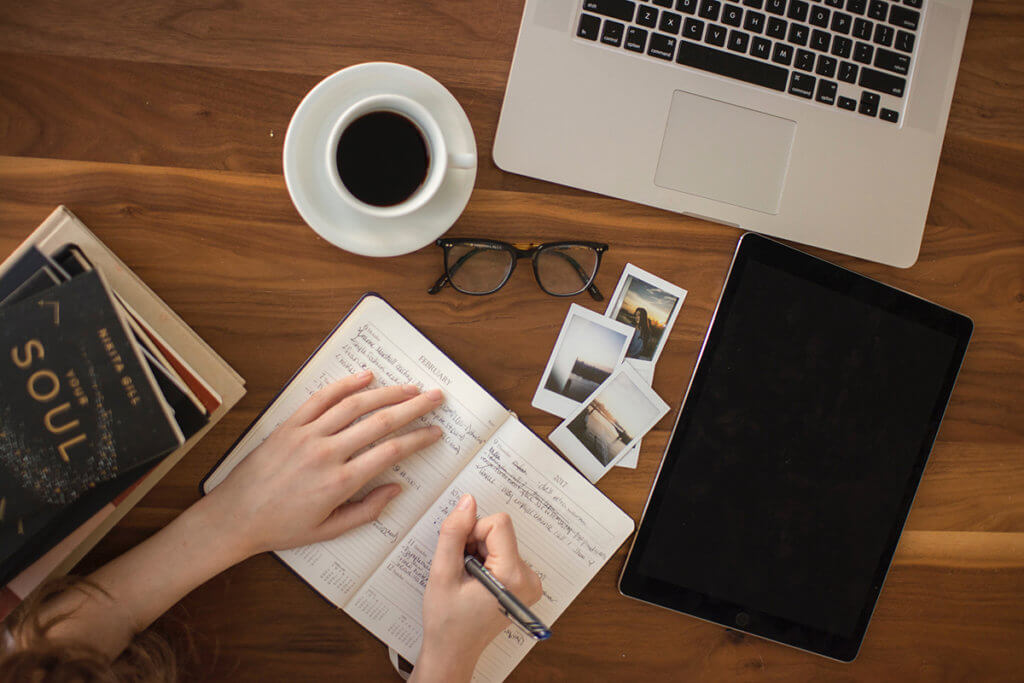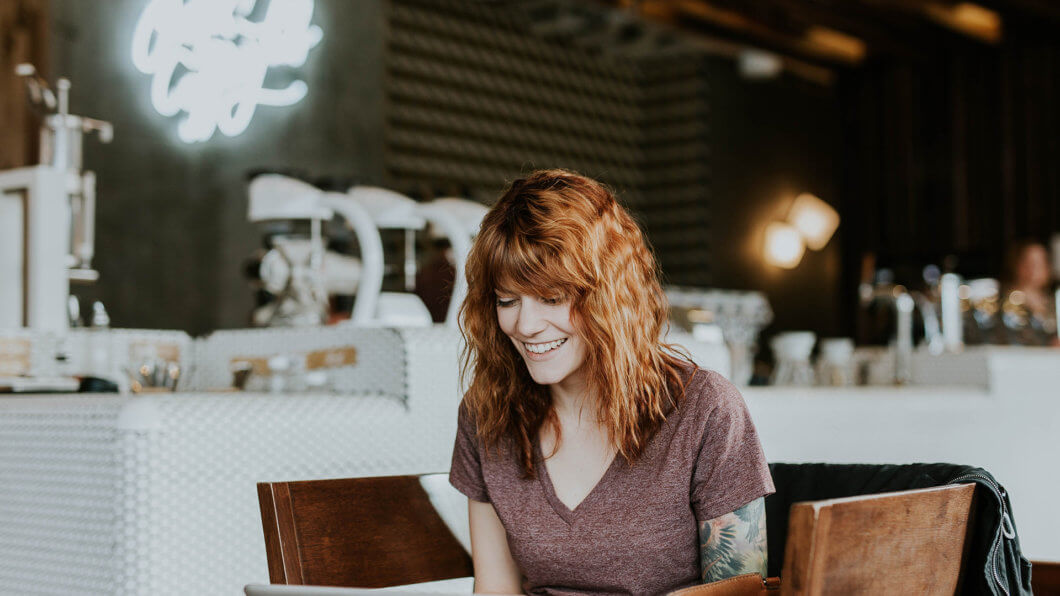In the coaching process, one’s own ways of thinking are often questioned, beliefs are unmasked and fears are intensely perceived. Increasingly, people with a positive mindset find it much easier to gain self-confidence and strengthen their resources through business coaching, as they only need to “remember” both. They possess a kind of primal confidence in themselves and in others, and this manifests itself in an optimistic frame of mind.
Accordingly, it is not surprising that a recent study by Boston University School of Medicine (BUSM) in collaboration with the National Center for PTSD at the VA Boston Healthcare System and the Harvard T.H. Chan School of Public Health shows that people with an optimistic outlook on life also live longer.
But how do you manage to permanently establish a basic optimistic attitude within your everyday life?
The essential components for the right mindset here are gratitude and serenity.
Already the famous writer Ernst Ferstl said:
“The art of a fulfilling life is the art of letting go: allowing – letting go – letting go.”
Ernst Ferstl
By reminding ourselves daily what we are grateful for, whether in a “gratitude journal” or in a silent thought process in the evening before going to bed, we gradually heal our longing for absolute fulfillment.
How to improve your mindset immediately
With these 10 helpful tips, you will learn how to successfully find your way to more gratitude, serenity and thus a positive basic attitude:
1. mindfulness for more calm and focus
It sounds like a trendy term, yet it can change everything. Becoming more mindful in your daily life “trains” your mind to become more grateful and optimistic. We then notice things we wouldn’t have noticed before, like a flower growing on the platform or an elderly lady sitting intently over her needlework. Instead of paying attention to the noise and stressed people around us, we pay attention to things and people that until then went unnoticed. In this way, we withdraw from the negative energy and come to more inner peace. We enjoy small moments much more intensely because they suddenly seem so special in an increasingly fast-paced world. The joy of being able to consciously direct our mind to the beauty of things changes our attitude and thus our way of thinking in the long run. We smile without being asked, are relaxed and see possibilities that seem invisible to those around us. This additionally broadens our focus, which in turn gives us the chance to work more specifically on our desires and visions. Keeping a “mindfulness diary” could be helpful here. So in the first phase, you don’t forget to look specifically for valuable moments in everyday life, at least until you no longer need to write them down, because you can consciously focus your thoughts and come to rest.

2. meditation – the journey inside
This subject area is already centuries old and yet has only become “fashionable” in recent years, so we must first get used to its existence. As we are increasingly confronted with external influences, we find it harder and harder to create a “place” internally that allows us to retreat. A meditation is like an intense daily mindfulness practice. It is the minutes that belong to you, where you are in a place that you only know yourself and are confronted with thoughts that can frighten or strengthen you. Many CEOs use meditation specifically as a retreat from everyday life, as a preparation and strengthening for an intense workday, or as a relaxation exercise to help them sleep with a clear and calm mind in the evening. This is where a course or a good app can help. Those who do not favor guided meditation can of course do it alone, with or without relaxing music in the background. The important thing here is consistency. Similar to competitive sports or, for example, learning a new foreign language, it is important to gain continuity in the practice of meditation. You can do this by marking the meditation as a fixed “appointment” in your calendar.
Small tip: Meditation often works best in the morning, because your thoughts are still free of the “ballast” of the day and you do not digress too often.
3. touch and relationship
One side effect of digitization that should not be underestimated is the development of a “contactless society”. Some phenomena seem particularly striking here: we shake hands with each other, strictly making sure that this touch does not exceed a certain amount of time and that a “courtesy distance” is maintained. On the train, we prefer to choose a single seat, hoping that no one will sit next to us during the journey. In the supermarket, where touching is basically unusual, we even avoid eye contact at the checkout to quickly go our way. However, man is a social being and how important (positive!) relationships are, we often only realize when loneliness has already set in. Admittedly, the exercise in touch is a lot easier for women than for men, as it often seems more innocuous. Girlfriends often touch each other, whether talking and laughing together, greeting and saying goodbye, or comforting each other. Of course, this has something to do with childhood (and the intimate connection with the mother) and with the role models and conventions that are prevalent in our society. For example, expressing feelings through speech or gestures is much more restrained in Asian countries than perhaps in South America. In the context of intercultural coaching and training, there is correspondingly intensive discussion of how individual actions and gestures can be interpreted in different contexts. What all cultural scientists basically agree on, however, is the fact that touch and (positive) relationships of any kind strengthen our basic trust, promote our resilience, activate our defenses (by releasing endorphins), make it easier for us to deal with fears, and awaken inner resources within us.
Promoting relationships and touch is relatively easy: greet friends or acquaintances with a touch, give your partner a kiss before going to bed, or actively listen to your counterpart. For just as a physical touch, a touch of the spirit is indispensable to human existence, and we can foster this through active listening. Through the appreciation, the feelings and the active touches that we exercise towards others, we strengthen ourselves at the same time, we become more serene and we rejoice and are happy about every connection made, which promises us courage and energy. A little tip: Don’t forget your own intuition. Drive your feet through your bedspread and just feel how it feels. Or massage your own temples or head area. Rediscovering your own intuition can be a wonderful experience.
4. fixed routines and habits
There are proponents and opponents of various to-do lists. This point is basically about giving oneself security through an individual daily structure. Of course, times of meditation, for a quiet lunch, or even purposeful breaks are also important. If you don’t have a routine, you may “lose” yourself at some point during the day and end up resenting having worked a lot but accomplished little. Whether digital or analog, a structure creates serenity, as we may not know everything, but at least the most important points of the day and can thus start the day more relaxed.

5. reflection of consumer behavior
Question your consumer behavior, both digital and analog. By constantly surfing other people’s Instagram profiles, looking at the latest IKEA trends and decorating ideas on Pinterest, or scrolling down our Facebook timelines in search of the seemingly “perfect” life, we unconsciously make ourselves increasingly unhappy. Of course, absolute asceticism is not a goal to strive for, and consumption need not always be a bad thing across the board. We also get new DIY ideas, read exciting articles, and learn through others to own less, waste less, and need less. But a healthy reflection on our consumer behavior is indispensable, because in the long run it helps us to think more positively, to be more grateful for what we already have and to become altogether more relaxed with ourselves and our environment. Take into account that more possessions often lead to more stress, because the goods not only want to be accumulated, but also defended. A good example of this is a house that in fact does not belong to us, but to the bank. However, we “defend” the ownership claim we have on it by gradually buying it from the bank. Should one find oneself in such a situation, it is accordingly advantageous to become aware of it in peace and quiet and to think of a relaxed strategy on how we can avoid “fear thoughts”, because otherwise consumption and the possessions that come with it can not be enriching, but become a curse. In addition, a healthy attitude towards one’s own consumerism is not only beneficial to one’s state of mind, but strengthens relationships with others and ultimately (quite simply) our own bank account.
6. coaching for a positive mindset
Coaching can be a helpful support in the process of one’s own personal development. Through coaching, deep-seated beliefs can be revealed and processed, one can create one’s own (inner) safe place to which one can retreat in stressful situations, or one can find out which factors particularly “trigger” one so that dealing with them becomes easier. A positive mindset always has something to do with personal growth. Accordingly, coaching should not be understood “as a last chance”, but should be taken up preventively as soon as one notices the signs (for example of overload or disorientation).
Always consider one thing:
The most valuable step, is the step to yourself – A coach can help you take that step.
Kinga Bartczak
7. sports
If you want to clear your head, this is the best way to do it and through the improved body awareness, our own self-perception changes and we also become more relaxed. However, no correlation is insinuated here, which suggests that slim and athletic people are serene, grateful and optimistic and others are denied this. In contrast, even excessive ambition and an unrealistic body image can be cited as counter-arguments here, both of which again lead to pressure and stress. Healthy movement simply means striving for the so-called “flow”, which allows one to be completely absorbed in the “here and now” and to be absorbed for a moment in complete relaxation (relaxation through tension, so to speak) without having to immediately go to one’s complete limit of exertion. Whether it’s yoga or jogging, it doesn’t matter. Here, too, it is important to have a fixed appointment, because you should not cancel an appointment and if you do, then it will be made up for in a scheduled manner. There should be no pressure on this point, sometimes you also have to first let go of your belief that sport is a necessary evil that you have to surrender to. In a one-on-one coaching session, such beliefs can be worked on very well and you start with a more positive and relaxed mindset, which may even open up the joy of exercise to you.

8. the significance of problems
“This day, too, shall pass” – Sometimes it helps to know that you are only a small part of the universe and, accordingly, that the burden of the whole world does not rest on your own shoulders. We often give a lot of thought to things that, a year later, we might just shake our heads at with a tired smile. In such situations, it is good to always keep in mind that we are part of a whole and that we can allow ourselves to make mistakes and wrong decisions, and that we even have to make them in order to grow from our experiences (read also my article on this topic: “Failure leads you to success – How we can use failures specifically for us“). It is much more relaxing to know that an apparent catastrophe may still be there the next day, but that overnight we were able to mobilize the resilient forces that allow us to deal with it well. In most cases, taking a deep breath and sleeping on it is not only a helpful tip, but also an indispensable trick for gradually gaining composure. In addition, it helps to have one’s own situation assessed by third parties, who usually have a neutral and objective view and can therefore approach certain issues with less emotion.
9. the myth of absolute serenity
There is no absolute serenity, because this could automatically lead to indifference. So it doesn’t matter if the barking dog is just upsetting you while you’re holding the stack of documents in one hand and the vacuum cleaner in the other, trying to keep the kid from using the toilet brush as a microphone. So it’s perfectly fine to specifically look for moments of relaxation. However, to focus on these frantically and yes not to look “unrelaxed” is usually not necessary, because anger, frustration and lack are also important teachers for us, which enable growth.
10. get into action
Now that you’ve read this article with its mindset tips, you’re thinking about your next steps.
My recommendation: Write down the next action steps, because everything you don’t put down on paper are just wishes and not goals. If it is important to you to permanently develop a positive attitude towards life, this can only be done by manifesting the whole thing (in writing) and then getting into action. It’s best to take one or two of the tips and try implementing them for two weeks on a trial basis. Don’t be frustrated if things don’t work out the way you want them to. Often our thoughts wander, we have urgent obligations to attend to, or life “calls” us back down to earth in some other way. The important thing here, too: Come back to consistency, even if it takes several attempts, because optimism, serenity and gratitude are easy to train, but turn out to be a lifelong task – The reward, however, is invaluable.




